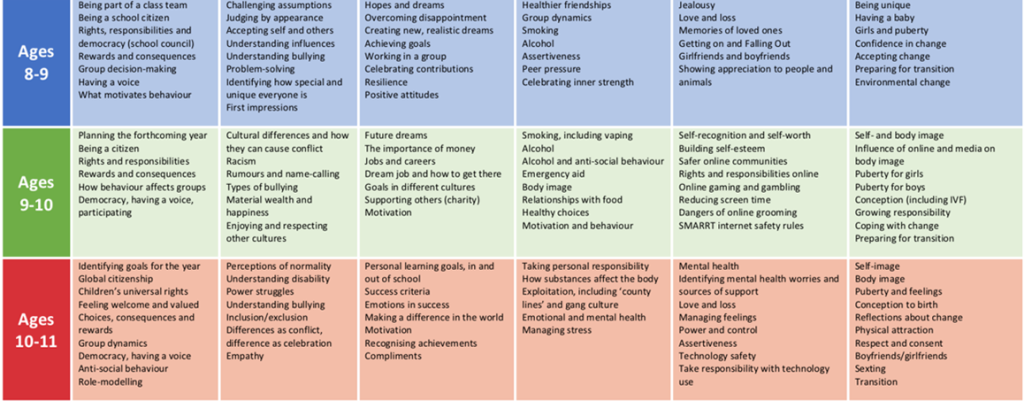Welcome to PSHE at Huntingdon Academy!

PSHE is lead across the school by Mrs Mather who is passionate about her role in ensuring that all children access a high quality PSHE curriculum within their designated PSHE lessons and beyond.
The PSHE Governor is Rachel Lewis and our Subject Ambassadors are;
Subject Overview
It is vital that the children at Huntingdon gain the appropriate knowledge and skills through their PSHE lessons to enable them to understand and respond to a variety of experiences and situations they will face, as they become adults. It is also important that we enable the children to understand how to keep a healthy lifestyle, develop positive relationships and understand changes they will go through as an adolescent (both physically and mentally). It is our responsibility to provide pupils with the knowledge, understanding, attitudes, values and skills they need in order to reach their potential as individuals and within the community.
Pupils are encouraged to take part in a wide range of activities and experiences across and beyond the curriculum, contributing fully to the life of their school and communities. In doing so, they learn to recognise their own worth, work well with others and become increasingly responsible for their own learning. They reflect on their experiences and understand how they are developing personally and socially, tackling many of the spiritual, moral, social and cultural issues that are part of growing up
It is crucial that children have the opportunity to learn and enjoy the different aspects of PSHE including taking part in circle time to embed social skills and turn taking. At Huntingdon Academy, we have an exceptional duty of care to ensure that children become proficient in managing feelings, understanding relationships and understanding physical and mental changes during adolescence. We aim to provide meaningful PSHE sessions to ensure our pupils learn to understand and respect our common humanity; diversity and differences so that they can go on to form the effective, fulfilling relationships that are an essential part of life and learning.
In our school, we choose to deliver Personal, Social, Health Education using the Jigsaw scheme of work, the mindful approach to PSHE. Alongside this, we include other opportunities that aim to develop the child’s personal, social and health education. For example, in addition to the Jigsaw curriculum that Huntingdon delivers, we also incorporate DARE (Drug abuse resistance education) sessions into our weekly PSHE lessons in year 6. We also plan whole school assemblies delivered by the NSPCC to focus on areas of learning such as positive relationships, understanding how to say no to inappropriate touch and who children can ask for help (child line).
National Curriculum links
Personal, social, health and economic education
Updated statutory guidance will come into effect from September 2020.
The revised curriculum subjects will be:
- relationships education (primary)
- relationships and sex education (RSE) (secondary)
- health education (state-funded primary and secondary)

Conceptual Knowledge Maps


Planning and pedagogy
The JIGSAW scheme of work is broken into six puzzle pieces which are taught in blocks within each year group across each half term.
| Term | Puzzle (Unit) | Content |
| Autumn 1: | Being Me in My World | Includes understanding my own identity and how I fit well in the class, school and global community. Jigsaw Charter established. |
| Autumn 2: | Celebrating Difference | Includes anti-bullying (cyber and homophobic bullying included) and understanding |
| Spring 1: | Dreams and Goals | Includes goal-setting, aspirations, who do I want to become and what would I like to do for work and to contribute to society |
| Spring 2: | Healthy Me | Includes drugs and alcohol education, self-esteem and confidence as well as healthy lifestyle choices, sleep, nutrition, rest and exercise |
| Summer 1: | Relationships | Includes understanding friendship, family and other relationships, conflict resolution and communication skills, bereavement and loss |
| Summer 2: | Changing Me | Includes Relationships and Sex Education in the context of coping positively with change |
PSHE is a subject which needs the class teacher to be directly involved with the children in the lesson to model good communication skills, lead discussions and debates on challenging topics, support children in managing their feelings, model how to practice mindfulness, set appropriate tasks linked to the topic and monitor and evaluate each child’s progress.
A good PSHE lesson will:
- Be delivered by the class teacher.
- Take place in a circle on the carpet (EYFS/KS1) or on chairs (KS2)
- Used a class ‘Learning charter’ to ensure all children understand and follow the class expectations and feel they are in a safe environment.
- Use a ‘Jigsaw friend’ to encourage turn taking and listening skills.
- Ensure all pupils are encouraged to take part and their ideas respected.
- Have a dedicated time for the children to practice mindfulness – mediation/calming time.
- Use a variety of approaches that are matched to the activity and the ability of the children.
- Cater for Special Educational Needs and Disabilities (SEND) children.
- Ensure always that issues of mental wellbeing and safeguarding are addressed in the planning and delivery of the PSHE curriculum (e.g. bereavement, domestic violence)
- Encourage the children’s development of personal and social skills, be fully inclusive and give equal access for pupils to access learning.
- Encourage children to work individually, in pairs, small groups and as whole class when required.
- Provide learning opportunities that enthuse, engage and motivate children to learn and participate in class discussions and develop their oracy skills.
- Develop children’s PSHE vocabulary which is appropriate and accurate and which develops and evolves from EYFS to KS1to KS2.
- Encourage children to recognise their own rights and responsibilities.

The Future for the children of Huntingdon Academy

PSHE is an area that we recognise, as a school, is an essential subject for all children and due to our school’s context outlined at the beginning of this policy, especially for the pupils at Huntingdon Academy. Now, more than ever, mental well-being is considered a contributing factor to the positive development and educational growth of a child. Therefore, we have chosen to use the JIGSAW scheme which builds on the idea of mindfulness and enabling the children to control their thoughts and emotions and understand their feelings. Giving the children time to clear the minds, practice breathing and calming techniques ensures that they are in the best mind-set to learn. We hope that along with the knowledge and skills they develop throughout their school life, they will also take these mindful techniques into adulthood and develop an awareness of their mental-wellbeing. Our children will leave Huntingdon Academy with the skills to build positive relationships, understand how to lead a healthy life, be aware of the changes their bodies will face during puberty and know the importance of aspirations and ambitions in building their future. We hope to send our pupils into the community and wider world ready for the challenges they will face.

